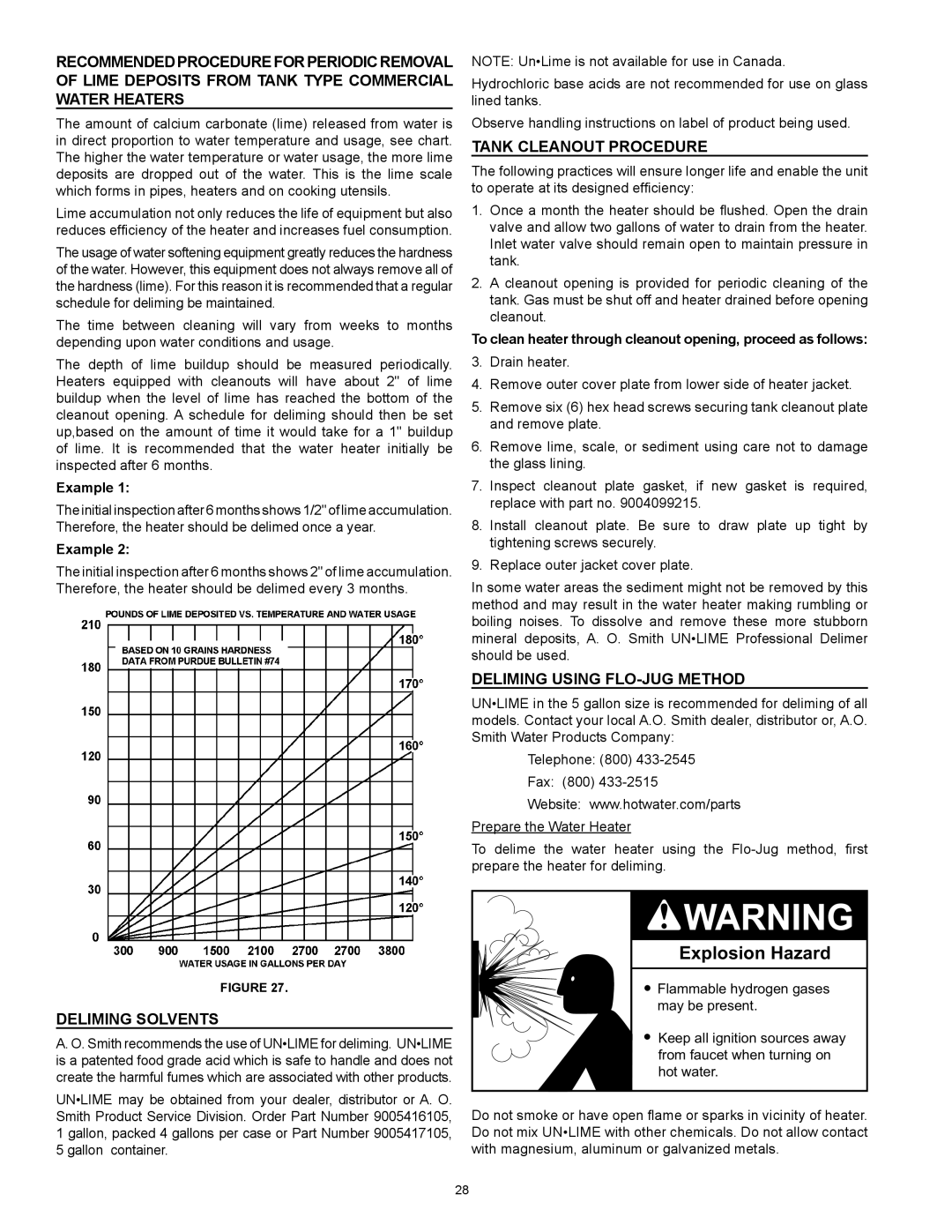
RecommendedProcedureforPeriodicRemoval of Lime Deposits from Tank Type Commercial Water Heaters
The amount of calcium carbonate (lime) released from water is in direct proportion to water temperature and usage, see chart. The higher the water temperature or water usage, the more lime deposits are dropped out of the water. This is the lime scale which forms in pipes, heaters and on cooking utensils.
Lime accumulation not only reduces the life of equipment but also reduces efficiency of the heater and increases fuel consumption.
The usage of water softening equipment greatly reduces the hardness of the water. However, this equipment does not always remove all of the hardness (lime). For this reason it is recommended that a regular schedule for deliming be maintained.
The time between cleaning will vary from weeks to months depending upon water conditions and usage.
The depth of lime buildup should be measured periodically. Heaters equipped with cleanouts will have about 2" of lime buildup when the level of lime has reached the bottom of the cleanout opening. A schedule for deliming should then be set up,based on the amount of time it would take for a 1" buildup of lime. It is recommended that the water heater initially be inspected after 6 months.
Example 1:
The initial inspection after 6 months shows 1/2" of lime accumulation. Therefore, the heater should be delimed once a year.
Example 2:
The initial inspection after 6 months shows 2" of lime accumulation. Therefore, the heater should be delimed every 3 months.
NOTE: Un•Lime is not available for use in Canada.
Hydrochloric base acids are not recommended for use on glass lined tanks.
Observe handling instructions on label of product being used.
Tank Cleanout Procedure
The following practices will ensure longer life and enable the unit to operate at its designed efficiency:
1.Once a month the heater should be flushed. Open the drain valve and allow two gallons of water to drain from the heater.
Inlet water valve should remain open to maintain pressure in tank.
2.A cleanout opening is provided for periodic cleaning of the tank. Gas must be shut off and heater drained before opening cleanout.
To clean heater through cleanout opening, proceed as follows:
3.Drain heater.
4.Remove outer cover plate from lower side of heater jacket.
5.Remove six (6) hex head screws securing tank cleanout plate and remove plate.
6.Remove lime, scale, or sediment using care not to damage the glass lining.
7.Inspect cleanout plate gasket, if new gasket is required, replace with part no. 9004099215.
8.Install cleanout plate. Be sure to draw plate up tight by tightening screws securely.
9.Replace outer jacket cover plate.
In some water areas the sediment might not be removed by this method and may result in the water heater making rumbling or boiling noises. To dissolve and remove these more stubborn mineral deposits, A. O. Smith UN•LIME Professional Delimer should be used.
Deliming Using Flo-Jug Method
UN•LIME in the 5 gallon size is recommended for deliming of all models. Contact your local A.O. Smith dealer, distributor or, A.O. Smith Water Products Company:
Telephone: (800)
Fax: (800)
Website: www.hotwater.com/parts
Prepare the Water Heater
To delime the water heater using the
FIGURE 27.
Deliming Solvents
A. O. Smith recommends the use of UN•LIME for deliming. UN•LIME is a patented food grade acid which is safe to handle and does not create the harmful fumes which are associated with other products.
UN•LIME may be obtained from your dealer, distributor or A. O. Smith Product Service Division. Order Part Number 9005416105, 1 gallon, packed 4 gallons per case or Part Number 9005417105, 5 gallon container.
Explosion Hazard
![]() Flammable hydrogen gases may be present.
Flammable hydrogen gases may be present.
Keep all ignition sources away from faucet when turning on hot water.
Do not smoke or have open flame or sparks in vicinity of heater. Do not mix UN•LIME with other chemicals. Do not allow contact with magnesium, aluminum or galvanized metals.
28
